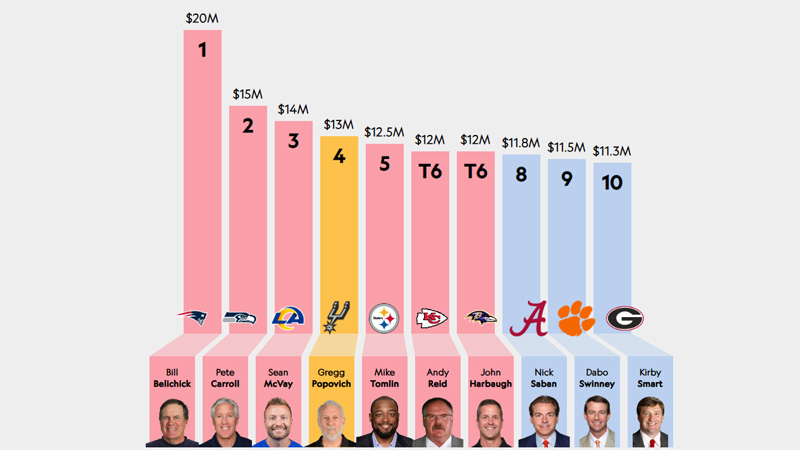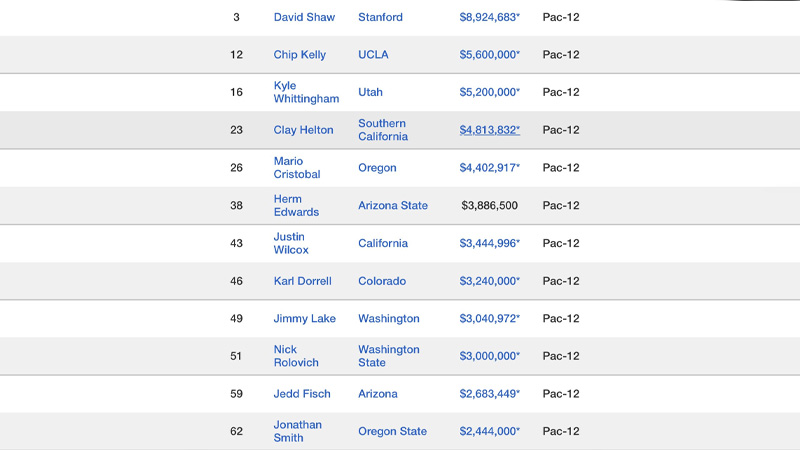Behind every successful soccer team, there stands a skilled and dedicated coach, orchestrating the players’ movements and strategies. The role of a soccer coach is pivotal, guiding athletes to reach their full potential and fostering teamwork and sportsmanship.
Yet, while the passion for the game fuels their drive, the question lingers: how much does a soccer coach make? From the local neighborhood fields to the grand stadiums, coaching salaries vary significantly based on multiple factors.
In this article, we unravel how much a soccer player makes, exploring the different tiers of the profession and the elements that impact their earnings. Join us on this captivating journey to discover the fascinating world of soccer coaching salaries.
How Much Does A Soccer Coach Make?
Below is an average estimation of a soccer coach’s income in different stages:
Youth and Amateur Soccer Coaches
At the grassroots level, youth and amateur soccer coaches form the backbone of the sport’s development. These coaches, often volunteers or part-time instructors, invest their time and passion to instill essential skills in young players.
In this segment, salaries can be modest or non-existent, especially in community-based programs where coaches may receive stipends or token payments. However, the intrinsic rewards of seeing young talents grow are immeasurable for these coaches.
High School and College Soccer Coaches
Stepping up the ladder, high school and college soccer coaches assume greater responsibility and expertise. They not only focus on developing skills but also strategize for competitive play.
Salaries for high school coaches can range from a few thousand to tens of thousands of dollars per year, varying significantly by the school’s budget, the success of the team, and regional factors.
On the collegiate level, soccer coaches at NCAA Division III schools may earn salaries in the range of $10,000 to $50,000 annually. For NCAA Division I or II programs, salaries can escalate significantly, sometimes surpassing $100,000 per year.
Additionally, some top-tier college coaches receive bonuses based on their team’s performance, contributing to their overall earnings.
Professional Soccer Coaches
At the pinnacle of the soccer coaching hierarchy lie the professionals who oversee clubs and national teams. These individuals bear immense pressure and accountability for their teams’ achievements.
Compensation for professional soccer coaches can span a broad spectrum. In lower-tier leagues or smaller markets, salaries may be relatively modest, ranging from $50,000 to $100,000 annually.
However, in top-tier leagues and prestigious international assignments, coaching salaries skyrocket. Coaches in major European leagues or those guiding national teams can earn several hundred thousand to millions of dollars per year.
Furthermore, some renowned coaches may secure endorsement deals or lucrative media contracts, further augmenting their income.
Influential Factors
Apart from the coaching level, several factors influence soccer coaches’ earnings. Experience is a vital determinant, as seasoned coaches with a proven track record command higher pay.
Additionally, coaching licenses and certifications play a role in salary negotiations, with higher qualifications leading to better remuneration.
Geographical location is another essential factor. Coaches working in developed countries or soccer-crazy regions tend to earn more due to the sport’s popularity and financial backing.
Highest Paying Cities for Soccer Coaches Near United States

Source: sportico
The highest-paying cities for soccer coaches near the United States were primarily located in Major League Soccer (MLS) cities.
However, it’s important to note that salaries and economic conditions can change over time, so it’s best to research the most up-to-date information. Here are some cities known for their high-paying soccer coaching opportunities:
New York City, New York
Home to New York City FC, one of the MLS teams.
Los Angeles, California
Home to LA Galaxy and Los Angeles FC, both MLS teams.
Seattle, Washington
Home to Seattle Sounders FC, another prominent MLS team.
Atlanta, Georgia
Home to Atlanta United FC, a successful MLS team with a strong fan base.
Toronto, Canada
Home to Toronto FC, a Canadian MLS team with competitive coaching opportunities.
These cities have well-established soccer teams with substantial financial backing, which can lead to higher salaries for coaches. Additionally, coaching opportunities might arise with other professional, semi-professional, or youth soccer clubs and academies in these cities, further contributing to potential high-paying coaching roles.
Remember, salaries can vary significantly depending on the level of coaching, the specific organization or team, individual qualifications, and experience. It’s always recommended to research current job openings and negotiate based on your qualifications and the specific circumstances of the job offer.
Top Companies for Soccer Coaches in the United States

Source: nytimes
There isn’t a comprehensive ranking of the “top companies” for soccer coaches in the United States, as soccer coaching opportunities can be found across a variety of organizations, including professional clubs, college teams, youth academies, and private training centers.
The best companies for soccer coaches can depend on various factors such as coaching level, specialization, location, and personal preferences. However, I can mention some notable organizations that offer significant coaching opportunities in the United States:
Major League Soccer (MLS) Clubs
MLS is the top professional soccer league in the United States and Canada, and coaching positions within MLS teams are highly sought after.
United Soccer Coaches (USC)
Formerly known as the National Soccer Coaches Association of America (NSCAA), USC is the largest soccer coaches organization in the United States. They offer coaching education, resources, and networking opportunities for coaches at all levels.
U.S. Soccer Federation
The governing body of soccer in the United States, U.S. Soccer, offers coaching positions at various levels, including national teams and developmental programs.
Colleges and Universities
Many colleges and universities across the United States have soccer programs that hire coaches for their men’s and women’s teams, ranging from NCAA Division I to smaller divisions.
Youth Soccer Academies
Numerous youth soccer academies and clubs across the country provide coaching opportunities for developing young talent.
Private Soccer Training Centers
Some private training centers and academies offer specialized coaching programs and individual coaching sessions for aspiring players.
High Schools
High schools with competitive soccer programs often employ coaches for their boys’ and girls’ teams.
It’s essential for soccer coaches to research and reach out to organizations that align with their coaching aspirations, experience, and expertise. Networking, attending coaching conferences, and staying involved in the soccer community can also lead to discovering coaching opportunities with reputable companies and organizations.
Remember that job availability and rankings may have changed since my last update, so it’s crucial to check the most recent job listings and coaching opportunities.
Five Categories of Soccer Coaching Roles and How Much They Make
Soccer coaching roles can vary widely in terms of responsibilities, level of play, and compensation. The following are five general categories of soccer coaching roles, along with a rough estimate of their potential earnings. It’s important to note that these figures are approximate and can vary significantly based on factors such as location, level of play, experience, and organization:
Professional Club Head Coach
Head coaches of professional soccer clubs lead the team’s training sessions, develop tactical strategies, manage player rosters, and oversee the team’s performance in matches.
The salary of a professional club head coach can range from $50,000 to several million dollars per year, depending on the league, club’s financial resources, and the coach’s reputation and track record.
College/University Head Coach
College or university head coaches are responsible for leading their respective men’s or women’s soccer teams. They recruit players, organize training sessions, devise game strategies, and represent the institution in competitions.
College head coaches can earn anywhere from $30,000 to $200,000 per year, with higher salaries often found in larger and more successful athletic programs.
Youth Academy Director
Youth academy directors oversee the development and progression of young soccer players in a club’s youth system. They implement coaching curriculums, mentor coaches, and identify talented players for potential promotion to higher levels.
Youth academy directors’ salaries can vary widely, ranging from $40,000 to $100,000 or more annually, depending on the club’s size, level of play, and available resources.
Assistant Coach
Assistant coaches support the head coach in various aspects of team management, including training sessions, game analysis, and player development.
Assistant coach salaries can range from $20,000 to $80,000 per year, depending on the level of play and the assistant’s experience and expertise.
Private Soccer Trainer
Private soccer trainers work with individual players or small groups to provide personalized coaching and skill development outside of team environments.
Private soccer trainers typically charge hourly or per-session rates, which can range from $30 to $150 or more, depending on the trainer’s reputation and the demand for their services.
These salary estimates are approximate and can change over time. Additionally, coaching salaries can vary significantly based on the specific circumstances of the coaching position and the region in which it is located.
As with any profession, successful coaches with a proven track record and a high level of experience can command higher salaries compared to those starting their coaching careers.
FAQs
What qualifications do I need to become a soccer coach?
To become a soccer coach, you’ll typically need at least a coaching license or certification issued by the relevant soccer association in your country. In the United States, for example, coaches can obtain coaching licenses through United Soccer Coaches (USC) and U.S. Soccer.
How do I get started as a soccer coach?
To get started as a soccer coach, consider taking coaching education courses offered by organizations like USC or U.S. Soccer. Volunteering to coach youth teams or assisting experienced coaches at the grassroots level can provide valuable practical experience.
What are the key coaching skills and attributes to be successful?
Successful soccer coaches possess a range of skills and attributes, including strong communication and leadership abilities, tactical knowledge, the ability to motivate and inspire players, adaptability, and a keen eye for player development. Being organized, approachable, and having a passion for continuous learning are also essential qualities.
What are the challenges of being a soccer coach?
Soccer coaching can be a demanding profession. Some challenges coaches may face include dealing with player injuries, managing team dynamics, handling pressure to achieve results, and balancing the demands of training and match schedules.
How much time does a soccer coach typically spend coaching and preparing for matches?
The time commitment of a soccer coach can vary based on the level of play and the season’s schedule. For professional coaches, the job can be a full-time commitment, involving daily training sessions, match preparation, travel, and administrative tasks.
Bottom Line
That was all about how much does a soccer player make. From nurturing young talents at the grassroots level to commanding the sidelines of world-renowned teams, soccer coaches occupy diverse roles in the realm of sports.
Their dedication to honing athletes’ skills and fostering a love for the game is invaluable, regardless of the financial rewards.
From our exploration of the spectrum of soccer coaching salaries, it’s evident that while some coaches earn handsome figures, their passion for the sport remains the driving force behind their pursuit of excellence.
As the soccer world continues to evolve, coaches will remain the guiding lights, inspiring players and fans alike with their knowledge, leadership, and unwavering devotion to the beautiful game.







